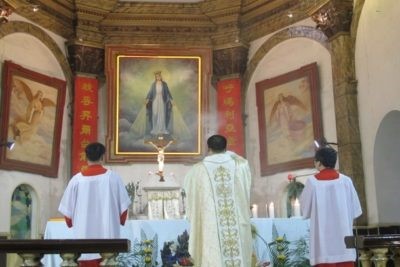– Tej Francis
tejfrancis@gmail.com
America
Attacks on religious communities ‘a wound on all humanity’ Trump tells UN
(Catholic Herald) ‘Stop the crimes against people of faith. Release prisoners of conscience. Repeal laws restricting freedom of religion and belief,’ Trump said
President Donald Trump joined world leaders to speak out against religious persecution at a Global Call to Protect Religious Freedom at the United Nations General Assembly in New York on Monday. “Today, with one clear voice, the United States of America calls upon the nations of the world to end religious persecution,” President Trump said. “Stop the crimes against people of faith. Release prisoners of conscience. Repeal laws restricting freedom of religion and belief. Protect the vulnerable, the defenceless, and the oppressed.”
Also speaking Monday, United Nations Secretary-General Antonio Guterres said that “the persecution of religious minorities is utterly intolerable.”
“We must do all we can to avoid religious cleansing of societies,” he said. President Trump delivered his remarks as the UN General Assembly (UNGA) meets for its 74th session in New York City on Monday. Praising the Global Call to Protect Religious Freedom, Trump claimed the event the first of its kind to be held at the UNGA.
In July, the Pew Research Centre released its 10th annual report on global religious restrictions. It found that global restrictions on religious freedom had intensified over the ten-year span from 2007 to 2017. In 2017, 52 countries had “high” or “very high” levels of restriction by governments, and 56 countries had “high” or “very high” levels of social hostility involving religion, the Pew report said.
Pew numbers from 2018 said that 83% of the world’s population lived in countries with high or very high religious restrictions; populous countries such as India and China, which also restrict freedom of religion, contribute to this high number, the report said. At the UN on Monday, Trump drew attention to the increased persecution of religious minorities around the world, including Christians. The president also announced a commitment by the administration of $25 million in funding “to protect religious freedom and religious sites and relics,” and to form a coalition of U.S. businesses to protect religious freedom especially in the workplace.
POLAND
The Polish Church is under attack, but it is standing firm
(Catholic Herald) Poland’s bishops recently commemorated the 80th anniversary of the outbreak of the Second World War with their German counterparts. Their shared message was a chance to evoke the heroic legacy of the Polish Church’s past struggles for democracy and human rights. Today, some Poles fear that legacy is being tarnished, as new scandals and controversies threaten the Church’s authority. Yet others insist the Church will weather the latest storms and may well emerge, in a distinctively Polish paradox, stronger and more self-assured than ever.
In the three decades since communist rule ended, the Polish Church has faced numerous assaults on its public role, on issues from abortion and school religion to accusations of financial misconduct and secret-police infiltration. With Catholics making up 85.8 per cent of the population of 38 million, according to a 2018 statistical yearbook, the Polish Church still provides a large proportion of all vocations in Europe, and is needed as a well-organised, articulate voice in international moral and religious discourses.
Its harshest opponents will go on fighting against it whatever it does to assuage criticisms, while its most committed supporters will continue defending it, despite the damage inflicted by a corrupt minority. That at least is nothing new. Having survived Nazi and Soviet invasions in 1939, and eight subsequent decades of war, communist repression and turbulent democracy, the Polish Church looks set to recover from the latest wave of adverse publicity.
CHINA
Altar boys serve at a Mass in Beijing in 2016
(Ucanews) Fewer young altar servers have participated at the Eucharistic celebration in some parishes since the Chinese government banned anyone under 18 from entering churches. Although the decline in young altar servers has not seriously affected the liturgy of the Mass, some Catholics worry that it will impact recruitment to the priestly vocation. The age restriction was launched nationally in 2018 and although it has not yet been strictly imposed in some areas the story is very different in others, such as the provinces of Henan, Shanxi and Liaoning.
A source in Liaoning Diocese, an open church community, told ucanews.com that the local authority had this month banned anyone under 18 from entering the church in his parish. The pastor has always trained youngsters to be altar servers at Mass most Sundays. “But we have now been told of this age restriction, so no more altar servers at the Mass,” the source said. He admitted that many priests and bishops had enjoyed good relations with Communist Party officials, who had turned a blind eye to what happened in church.
“But since the inspector’s team came, everything has become very strict,” said the source, who hoped the situation might return to normalcy after the inspectors have left the parish. The source said that in a short run, the effect on the parish would be minimal; since services do not usually have altar servers present, but he worried it might affect the priestly vocation.
“The seminary in Liaoning Diocese has been struggling to enrol young men. No one is coming in,” he said. According to reports by the Holy Spirit Study Centre, there had been a significant drop of the number of seminaries and seminarians across the country.



 Follow
Follow


